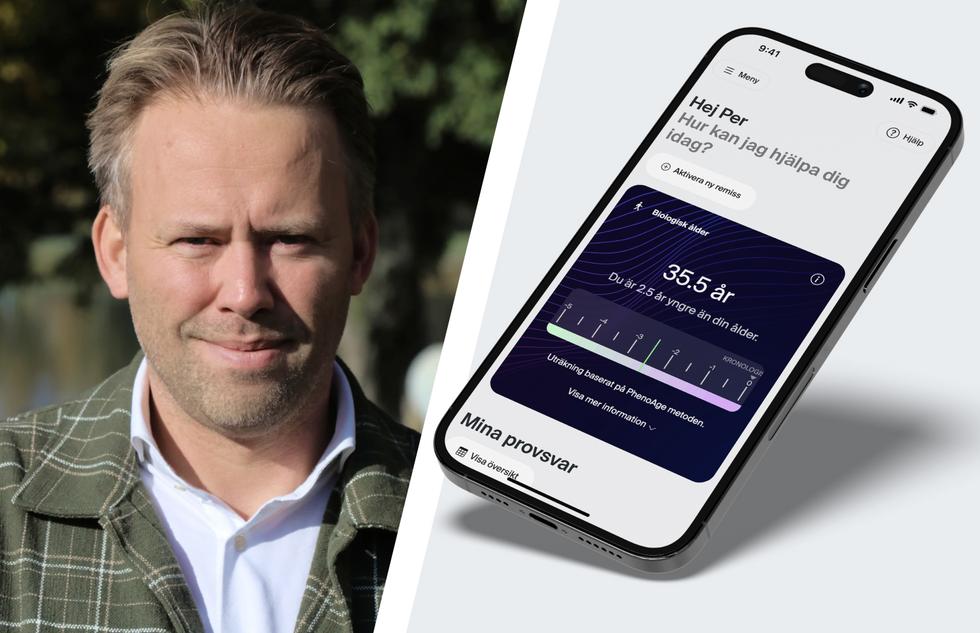Quick version
Your biological age shows how your body is really doing – and may differ from your actual age. A higher biological age can increase the risk of diseases such as cardiovascular disease and diabetes.
By analyzing specific blood markers and placing these in a calculation model, your biological age can be estimated. If your body is aging faster than your actual age, lifestyle changes such as better nutrition, more exercise and less stress can make a difference.
At the Test Clinic you can easily test your biological age via a blood test – and gain valuable insight into your health – read more below.
What is biological age?
So what is biological age? It is a value that describes how well your body is functioning compared to your chronological age (the one on your passport). Using blood-based biomarkers, researchers have developed a model to create a more accurate picture of health status and aging.
PhenoAge – a scientifically based method
PhenoAge is a computational model developed by researchers at UCLA and is one of the most validated methods for measuring a person's biological age. This model is based on analyses of nine blood-based markers that reflect systemic changes in the body and affect the risk of disease and mortality. These include:
- Albumin – reflects liver and kidney function.
- Glucose – indicates blood sugar control and diabetes risk.
- C-reactive protein (CRP) – a marker of inflammation.
- Lymphocytes – indicates the status of the immune system.
- MCV (mean cell volume) – linked to blood cell production and oxygen transport.
- Erc(B)-RDW (Red blood cell) – reflects the oxygen-carrying capacity of the blood.
- Total leukocyte count (WBC, white blood cells) – indicates immune system activity and may indicate infection or inflammation.
- Creatinine – indicates kidney function.
- Alkaline phosphatase (ALP) – can indicate liver and bone metabolism.
When you purchase one of our larger health checks, biological age is also included – completely free. (Applies to Health Check Large, Man, Woman and Man and Woman Plus.)
How your biological age differs from your chronological age can be estimated with the Pheno Age model, by analyzing all these markers and then comparing them with large amounts of data in an advanced algorithm.
Erik Lind, medical director at the Testmottagningen, says:
"Your biological age reflects the actual wear and tear and function of your body rather than the number of years you have lived. Using advanced models like Pheno Age, we can analyze a number of important biomarkers and compare them with large amounts of data to estimate your biological age. This gives a more nuanced picture of your health and can help you understand how your lifestyle affects your aging."
"It is not uncommon to see differences of ten to twenty years between chronological and biological age. By analyzing these markers, we can identify areas where you can influence your health and potentially slow down your biological aging."
That's why it's valuable to test your biological age
By knowing your biological age, you can gain valuable insight into your health status, biological age can also help identify risk factors in time. If your biological age is higher than your actual age, it may be a sign that you need to make lifestyle changes, such as eating a better diet, being even more active with physical activity or improving your stress management and sleeping more.
How you can influence your biological age
It is actually the case that your lifestyle has a great impact on how you age biologically. By making some changes, you can reduce your biological age and improve your health:
- Exercise regularly – Exercise, especially strength training and cardio, has been shown to slow down aging.
- Eat nutritious foods – A diet rich in antioxidants, fiber, and healthy fats supports cellular health.
- Avoid smoking and alcohol – Both of these factors accelerate cellular aging and can increase your biological age.
- Get enough sleep – Sleep is essential for the body to repair itself and stay young.
- Reduce stress – Prolonged stress can have a negative impact on cellular aging and contribute to inflammation in the body.
Test your biological age
A simple blood test can provide a detailed analysis of your biological age and get guidance on how you can improve your health. The health test package Biological age is included in our larger health checks (completely free) but you can also choose to order and carry it out alone to gain insight into your biological age and get answers to how old you really are.


























